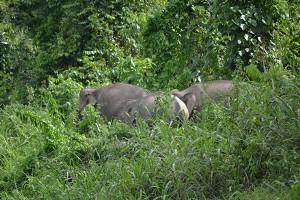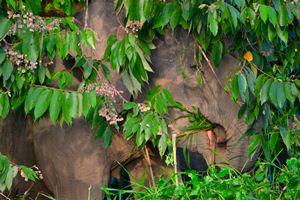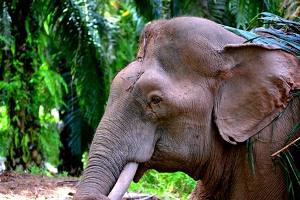Stephanie Hing
This project, the first on endoparasites of endangered Bornean elephants, aims to improve our understanding of deforestation and disease - key threats to habitat and species survival.
Endangered Bornean elephants Elephas maximus borneensis are fighting for survival in what remains of their severely fragmented habitat in Sabah, Malaysia. Over the past decades, their home, one of the most biodiverse regions on Earth, has been transformed dramatically to meet demands first for tropical timber and now palm oil. The remaining suitable elephant habitat is patchy, lacks connectivity and is cut by roads, settlements, small holdings and plantations.

A herd of wild elephants in Tabin Wildlife Reserve.
This project adopts a conservation medicine or One Health approach, linking animal and ecosystem health, to investigate the interaction between fragmentation of elephant habitat and internal parasite infection. Studies on wild populations of various taxa indicates that habitat fragmentation has the potential to alter infection dynamics in a variety of ways for example by increasing population density and thus increasing parasite transmission rates, influencing nutrition and subjecting animals to psychological and physiological stress.

A glimpse of elusive elephants (and their parasites).
Currently, the impact of deforestation on the health of wild animal populations is poorly understood despite the fact that habitat loss and disease are recognised as significant threats to global biodiversity. This study will improve our understanding of the impact of anthropogenic habitat change on wildlife disease dynamics. The prevalence, load and diversity of internal parasites will be compared between Bornean elephants in two areas, the Lower Kinabatangan and Tabin, which differ in the degree of habitat fragmentation and elephant population density.

Tusker.
Evaluating the impact of anthropogenic habitat loss on wild animal disease dynamics will contribute to monitoring and management strategies that consider interacting threat processes. This is not just the first glimpse into the guts and glory of living free ranging wild Bornean elephants but also the basis for a more holistic approach to in situ conservation. If we can better understand, monitor and assess the impact of interacting threatening processes, we will be better able to manage individuals, populations and habitats at risk.
This project is part of a MSc in Conservation Science at Imperial College London and is supported by the Rufford Small Grants Foundation, Zoological Society London, Chester Zoo, Danau Girang Field Centre and Sabah Wildlife Department.